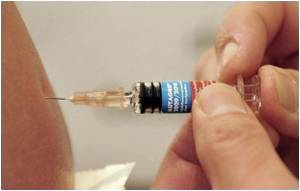A social and emotional skills intervention developed to help children recover from the trauma of natural disasters is being adapted to help young Syrian refugees.

Powell said, "Oftentimes there's programming available for children who have diagnosed mental health issues, but there's not much available for children who are at risk. Or the services are not accessible because of cost, distance or other factors. Although JOH was developed for disaster victims, the curriculum is broadly applicable to young people in general, including those who don't have clinical mental health diagnoses or aren't experiencing mental health problems."
The federal Substance Abuse and Mental Health Services Administration recently reviewed JOH and issued its stamp of approval, adding the program to its registry of Evidence-based Programs and Practices.
The Save the Children website reveals that since JOH's inception in 2007, the program has served 80,000 children, including residents of Christchurch, New Zealand, after a massive earthquake in 2011; youth in New York City and New Jersey affected by Superstorm Sandy in late October 2012; and young people in Moore, Oklahoma, the site of a deadly tornado in 2013.
Children are among the most vulnerable groups during and after natural disasters and are at higher risk of developing various mental health problems, such as acute stress reactions, depression, anxiety disorders and post-traumatic stress disorder. They also are more likely to fight or be bullied, according to a new study by Powell and Lori K. Holleran-Steiker of the University of Texas at Austin.
Their research, reported in Clinical Social Work Journal, is a case study of the JOH program's impact on children who survived a series of tornadoes at Tuscaloosa, Alabama, in 2011. The team interviewed social workers, 14 JOH program facilitators and 30 children. The JOH program comprises eight one-hour sessions that help children learn to recognize and manage their emotions, and to build resilience through self-esteem, self-efficacy and social support. Participants engage in cooperative games that promote healthy peer interactions and group problem solving, journal about feelings such as grief and create skits to explore effective coping strategies.
Advertisement
While various agencies had rallied to provide Hurricane Katrina victims with mental health services immediately after the storm pummeled the Gulf Coast in August 2005, two years later those resources had dwindled as a result of funding cuts and perceptions that the crisis was long past and victims no longer needed help.
Advertisement
The JOH sessions helped young disaster victims articulate their feelings, process grief and regulate emotions such as anger and aggression. The JOH alumni also got along better with others, were able to concentrate better in school, improved their communication skills and learned how to handle bullying incidents, the researchers found in a related study.
As Powell found when working with the children in New Orleans, a natural disaster may be just one among a number of stressors causing turmoil in a child's life.
Powell said, "I remember my supervisor in New Orleans said to me: 'Katrina was just another traumatic experience for these kids. These kids had been having these distressing experiences their entire lives - including poverty, community violence and substance use in their neighborhoods. A lot of them had lost their houses in Katrina, but they had been transitioning between different homes their whole lives, and that's the stuff they wanted to talk about - not what they lost in the hurricane."
Source-Eurekalert









